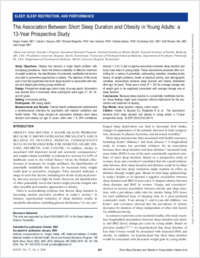The Association Between Short Sleep Duration and Obesity in Young Adults: a
13-Year Prospective Study
DOKPE
- Hasler, Gregor ORCID University of Fribourg
- Buysse, Daniel J National Institutes of Health, Bethesda, MD, USA
- Klaghofer, Richard National Institutes of Health, Bethesda, MD, USA
- Gamma, Alex National Institutes of Health, Bethesda, MD, USA
- Ajdacic, Vladeta National Institutes of Health, Bethesda, MD, USA
- Eich, Dominique National Institutes of Health, Bethesda, MD, USA
- Rössler, Wulf National Institutes of Health, Bethesda, MD, USA
- Angst, Jules National Institutes of Health, Bethesda, MD, USA
- 2004
Published in:
- Sleep. - Oxford University Press. - 2004, vol. 27, no. 4, p. 661-666
English
Study objectives: Obesity has become a major health problem with increasing prevalence. Given the limited availability of effective treatment of weight problems, the identification of potentially modifiable risk factors may lead to preventive approaches to obesity. The objective of this study was to test the hypothesis that short sleep duration is associated with obesity and weight gain during young adulthood.
Design: Prospective single-age cohort study of young adults. Information was derived from 4 interviews when participants were ages 27, 29, 34, and 40 years.
Setting: Community setting.
Participants: 496 young adults.
Measurements and results: Trained health professionals administered a semistructured interview for psychiatric and medical conditions and health habits. This study showed an association between short sleep duration and obesity (at age 27 years, odds ratio: 7.4, 95% confidence interval: 1.3-43.1) and a negative association between sleep duration and body mass index in young adults. These associations persisted after controlling for a variety of potentially confounding variables, including family history of weight problems, levels of physical activity, and demographic variables. Associations between sleep duration and obesity diminished after age 34 years. There was a trend (P = .08) for average change rate of weight gain to be negatively associated with average change rate of sleep duration.
Conclusions: Because sleep duration is a potentially modifiable risk factor, these findings might have important clinical implications for the prevention and treatment of obesity.
Design: Prospective single-age cohort study of young adults. Information was derived from 4 interviews when participants were ages 27, 29, 34, and 40 years.
Setting: Community setting.
Participants: 496 young adults.
Measurements and results: Trained health professionals administered a semistructured interview for psychiatric and medical conditions and health habits. This study showed an association between short sleep duration and obesity (at age 27 years, odds ratio: 7.4, 95% confidence interval: 1.3-43.1) and a negative association between sleep duration and body mass index in young adults. These associations persisted after controlling for a variety of potentially confounding variables, including family history of weight problems, levels of physical activity, and demographic variables. Associations between sleep duration and obesity diminished after age 34 years. There was a trend (P = .08) for average change rate of weight gain to be negatively associated with average change rate of sleep duration.
Conclusions: Because sleep duration is a potentially modifiable risk factor, these findings might have important clinical implications for the prevention and treatment of obesity.
- Faculty
- Faculté des sciences et de médecine
- Department
- Master en médecine
- Language
-
- English
- Classification
- Pathology, clinical medicine
- License
-
License undefined
- Open access status
- green
- Identifiers
- Persistent URL
- https://folia.unifr.ch/unifr/documents/327485
Statistics
Document views: 115
File downloads:
- hasleretal.2004e: 127
